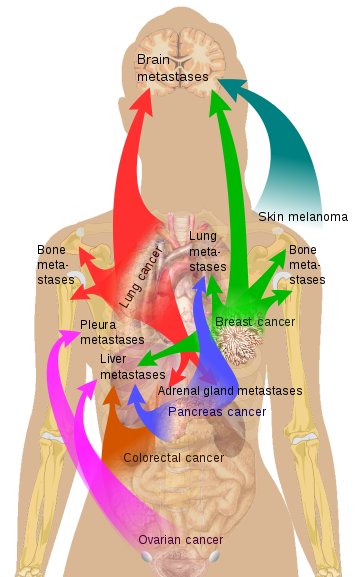A scientist from the Universitätsklinikum Erlangen, Heiko Bruns, pursues an innovative hypothesis on cancer metastases. He wrote his doctoral thesis on tuberculosis bacteria hidding in macrophages, and his postdoctoral thesis focused on the importance of macrophages in the context of cancer metastasis.
Macrophages are a type of white blood cell, which gobbles up and digests cell debris, foreign substances, microbes and cancer cells. Macrophages enter damaged tissues by the endothelium of blood vessels, a process known as extravasation. This process is very similar to what is currently thought to be the metastasis process.
 Classical conception of the metastasis process
Source: doi: 10.1038 / nri3789
Classical conception of the metastasis process
Source: doi: 10.1038 / nri3789
It is well known that macrophages can contribute to the growth and progression of cancers. Macrophages can also positively and negatively influence the results of anti-cancer treatments. Unfortunately some pathogens managed to lives inside those powerful macrophages. This allows them to escape from the immune system. This is the case with Mycobacterium tuberculosis or HIV.
Metastases are responsible for most of the deaths caused by cancer. Dr. Bruns believes that it is currently unclear how metastases form. So far, it has been assumed that they spread throughout the body via the lymphatic vessels and the bloodstream. But this mechanistic hypothesis cannot explain why some organs are preferably targeted in metastasis while other are relatively preserved. This was first discussed as the "seed and soil" theory by Stephen Paget in 1889.
 Source Mikael Häggström via Wikipedia
Source Mikael Häggström via Wikipedia
Paradoxically, cancer patients with a high number of macrophages have a reduced life expectancy. In a mouse model, tumor growth almost stops when the macrophages where removed.
Heiko Bruns assumes that individual tumor cells are consumed by phagocytes, but are not necessarily eliminated by them. Instead, he suspects that tumor cells are using macrophages as "Trojans horses". They could thus escape detection and travel through the body to colonize other organs.
Dr. Heiko Bruns' idea was accepted into the 'Experiment! In search of bold research ideas' based on this unusual question. This idea received funding of 120,000 euros from the Volkswagen Foundation until the end of 2021.
